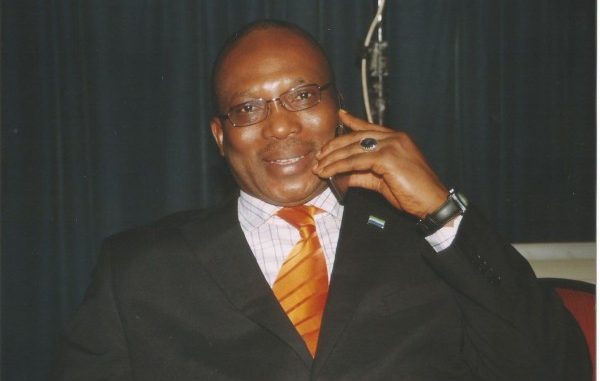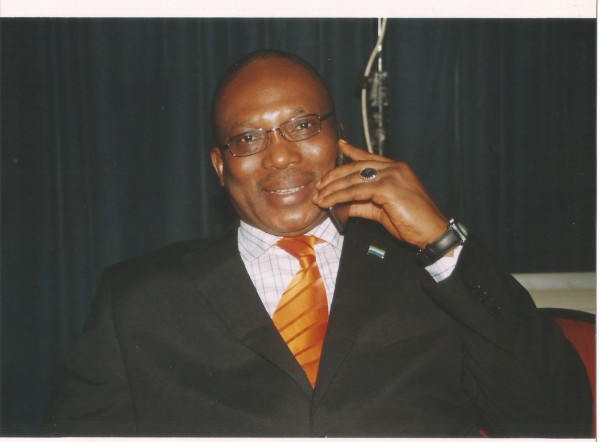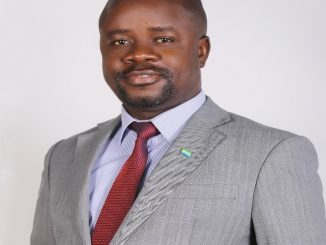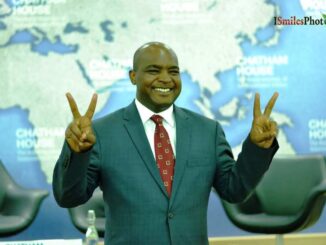
By Honourable Adikalie Sumah, Sierra Leone Ambassador to the Republic of Guinea, Dean of the Diplomatic Corps in Guinea and Member, Sierra Leone Bar Association.
Making Sense of the Supreme Court of Sierra Leone’s Ruling on the Matter of the Former Vice-President: Hon. Alhaji Samuel Sam Sumana -v- A-G and Minister of Justice and Hon. Victor Bockarie Foh.
The Constitutional Test Case relating to the relieving of the former Vice-President of the Republic of Sierra Leone, Hon. Alhaji Samuel Sam Sumana; has finally been laid to rest when, on the 9th day of September 2015, the Supreme Court of Sierra Leone, being the Highest Court of Judicature of the Land, in the exercise of its Original and enforcement jurisdictions as couched under Sections 124 and 127 of the Constitution of Sierra Leone (as amended) Act (no. 6) of 1991, handed down its Land Mark Ruling on the matter.
It could be recalled that, since the occurrence of events, the nation was plunged into wide spread speculations as to the legitimacy of the action taken by His Excellency Dr. Ernest Bai Koroma, President of the Republic of Sierra Leone to fill in the vacancy which occurred in the Office of Vice-President of the Republic of Sierra Leone. The exchanges of legal, political, sociological and journalistic opinions etc; have, in no minute measure, added to the development of the nation’s legal jurisprudence. This is indeed, salutary in a democratic society.
Like the largely uncertain situation in which the country found herself at the outset of events, the land mark determination did also open the floodgate to a plethora of legal, political, sociological and journalistic reviews of the ruling.
It is interesting to observe that, a number of written as well as parol reviews continue to cling on to the notion of unconstitutionality of the procedure adopted and followed in addressing the issue. This, in it self, is not unique, since the holding of ideas; be it scientific, technological, political and or sociological etc; and the expression and dissemination of such ideas is allowed in a democratic society as long as such do not infringe into the right of others as expected in a democratic milieu.
However, what appears to be unique in this particular matter is that some commentators waded into the argument for political grade points under the thin guise of defending and upholding the tenets of our national Constitution. It is proper for the citizens to express their personal or professional view points relating to constitutional issues including the instant issue. However, it is equally improper to have utilised the moment to trade profane language against personalities of the State edifice by reason of the Constitutional Questions posed, without catching breath for the Supreme Court of Sierra Leone to declare the constitutionality or unconstitutionality of the executive action.
I believe, we, as a Nation-State; should, in the first place, acknowledge the display of professionalism by our legal luminaries involved in dealing with these very tough, very difficult and very unprecedented Constitutional questions arising form the matter. These attributes of the Case rendered it as “a matter of first impression” laid before the Supreme Court for consideration.
From a keen angle of patriotic conscience, it is noted that of all of the reviews that I have the opportunity to read since the promulgation of the ruling, with respect, not a hint of such reviews acknowledged the standpoint that, the arguments advanced by both Counsels for the Plaintiff and the Defendants really showcased the very fine talents of our fellow citizens in the legal domain of Sierra Leone. If anything, their bold ventures to represent their respective clients made it possible for the Justices of the Supreme Court of Sierra Leone to deliver the land mark ruling which settled the uncertainty hitherto entertained by certain compatriots in respect of the interpretation of the relevant Sections of the Constitution of Sierra Leone (as amended) 1991, in particular Sections 40 (1) (b), 41 (1), 50 and 51 etc. The fact that, it has been handed down by the Highest and Final Arbiter of the Land, there is nothing one can do but to accept and respect its verdict.
Without doubt, our respected and Learned Justices scrupulously filtered the provisions of the 1991 Constitution that neatly have close nexus with the issues arising. Amidst the high polarities of party political opinions, coupled with the wider public interests in the matter, all of the five Learned Justices faced the moment and demonstrated their robustness in dealing with the Constitutional questions laid before them for determination. With astute professionalism, they interpreted the relevant Sections of the Constitution that would reasonably provide answers to those questions, and ensured a comprehensive scope of the ruling which captured each and every salient point at issue; that needed evaluation in order to reach a well balanced outcome.
By this landmark ruling, the presiding Learned Justices of our Supreme Court had meticulously developed and added a New Case Law to the existing precedence which forms part and parcel of the Laws of Sierra Leone. Therefore, perceived Ernesto-skeptics in this highly sensitive Constitutional conundrum, should, by this final verdict, be bold and courageous enough to now believe that, he is not only a careful Chief Executive in the governance of the Republic, but also a President who listens to various sides of opinions.
In this piece, I will endeavour to review the Land Mark Ruling in order to make sense of it, and to point out, how it would impact the operation of our national Constitution, at least, in the foreseeable future of our burgeoning democracy.
With meekness of purpose, let it be known; this piece is intended only to add to the ongoing reviews of the Supreme Court’s ruling on the matter under review. Conversely, it is not, in any way, intended to defend our Learned Justices or infuriate anyone. However if, in the remotest possibility it does, let it be treated as a pang or fury occasioned by an academic and independent legal discourse.
I consider reviewing the claims levied by some astute commentators that, our Supreme Court judges have usurped the legislative functions of Parliament, to be an ideal launch pad for this discourse to set off. For this reason, with respect, I would like to examine the notion of exclusivity of the Legislature as the sole Body in a democracy which, by reason of the Doctrine of Separation of Powers, holds itself out, to command the exclusive mandate to enact every Primary and secondary Legislation, and that the object of the Judiciary is primarily to interpret and apply the law flowing from the legislation as reasonably intended by Parliament. This exclusive domain of Parliament in the enactment of legislation explains and upholds the principle of Parliamentary Supremacy pursuant of the Laws of the Constitution. Supreme in the sense that Parliament has the omnipotent capacity to make any law, including a law to snatch away, limit its legislative supremacy, or even curtail its life in being. This is well known to lawyers and political scientists of the realm.
However, while so well suited, parliament has interpretative limitations of its own coined pieces of legislation. The Judicial Arm of government, in accordance with the doctrine of separation of powers, is not only the judicial arbiter, but it is also the judicial auditor and evaluator of the activities of the Executive Arm of government under the notion of checks-and-balances. Moreover, it is the state institution which interprets any parliamentary legislation including national Constitutions by way of filtering the wording and contextual structure or design of the legislation for the purpose of discovering the reasonable intention of Parliament.
In the process of discharging its interpretative and filtering of statement of facts, jurisdictions, Judges, as well as professional officials of the judiciary, do and clearly so, make law, especially so in a matter of first impression such as the one under review. That is why Lawyers, more often than not, refer to precedents as Judge-made-Law. Although neither being primary nor secondary legislation in the sense of an enacted law, the precedents which flow from the interpretative and the reasoning of the tribunal of facts, in piecemeal, formulates the judge-made-law.
Under the principle of stare decisis, the Courts are expected to follow and apply the reasoning adopted in prior Case decisions with close nexus to the one before them for consideration. However, where, in their informed evaluation of the matter before them for consideration in light of the existing law – be it statute or common law, the Court discovered it to be fundamentally distinct from all previous cases, judges have the authority and duty to enunciate new precedent, and thenceforth, that new precedent becomes law until distinguished.
I strongly hold the view that, the esteemed Learned Justices, with due respect, are not expected by my compatriots to have blindly engaged a canon or canons of Statutory interpretation which would further compound the already difficult constitutional issue before them, with grave potentials capable of leading to inherent absurd conclusions of same. This is also true of the use of precedents in a matter before the Court. It is equally important to point out that, judges are not expected to have sweepingly applied a precedent such as the Akitu Abubakarr case which was determined by the Supreme Court of the Federal Republic of Nigeria. The Court, I daresay is not vertically bound by the precedents wholly drawn from foreign sovereign judicial jurisdictions. Essentially, their utility by the Courts of Sierra Leone stand to serve largely a persuasive purpose. That is to say; they could be cited in obiter dictum (statement said in passing) but would not form part of the ratio decidendi (the reason for the decision) of the Case, on its own merit only without a substantive precedent drawn form the Sovereign jurisdiction of the Ordinary Courts of judicature of the realm to bolster its relevance in the case which is the subject for judicial consideration. This position is succinctly dealt with under the ruling by their esteemed Justices.
It is submitted that to apply any precedent to the matter which was before them for a determination, the Learned Justices had to, with caution; consider the precedent in the round, in particular, to ascertain its origin, and whether or not it is appropriate to adhere to it by injecting same to the facts of the instant Case. Nothing supports this view better than the postulation of Justice Benjamin Nathan Cardozo, a former Associate Justice of the Supreme Court of the United States when he maintained that, the role of Judges is to “fashion law where there is no precedent and take into consideration how it would impact the future.
So, besides the inherent role of making law, ‘it is also the role of judges to re-examine and tinker with old laws to ensure that, they withstand the test of time’. This postulate could even be stretched to the analogy of a sound medical doctor possessing the courage to face his waning patient and his concerned family members with the realities of his medical situation. Cardozo J, believed that, ‘a good judge must have the courage to make choices and judgment’.
Without a speck of doubt, in the this matter under review, we have seen how our Learned Justices demonstrated their individual and collective courage in making choices as to which canon of statutory interpretation would best suit their onerous judicial task of discovering the reasonable intention of the framers and legislature of the 1991 Constitution as so provided for under Sections 40, 40 (1), (b), 54 (8) to cite but a few instances, and devoid of fear or favour; delivered their ruling.
Experts and Readers of the Laws of the Constitution widely hold the view that, in “hard Cases”, judges do and can make new law. This is more often than not occurs in two areas:
(1). In the process of developing the Common Law; and
(2) In the legal skill and process of interpreting statutes.
Consequent to the settled fact that Parliament does not give definitions to each and every possibility flowing from its coined legislation or define and explain every term expressly contained in the statute, these limitations would always give rise to the employment of judges to interpret Statutes such that the reasonable intent of Parliament as expressed in the statute can be applied to the case before them.
It is compelling to point out that while it remains the starting point for the interpretation of legislation, the literal rule is now being seen to be going out of fashion with judges across the world. So what Lord Scarman viewed as a judicial coup on Parliament by Lord Dennings well over 50 years ago, in Margor and St. Mellons R. D. C -v- Newport Corporation (1950) CA, All ER 1226; it is now the most preferred canon of statutory interpretation.
As widely acknowledged; the matter under review is unprecedented in our political and constitutional annals. Given this position, the presiding Justices of the Supreme Court were exposed to deal with a matter that is destitute of an earlier Case Law (precedent) primarily emanating form the Jurisdiction of Sierra Leone which, in their informed judgment, could be engaged and applied to the case before them. It is submitted that where a precedent is lacking in respect of a matter which is the subject of determination by the Courts and or where precedent does not spell out what should be done in a case before them, judges, nevertheless have to make a decision. They cannot simply say that, the law is not clear and elect to refer it to Parliament for remedy. They have to make and promulgate a decision on the matter as expected of them pursuant of their Constitutional role on the one hand and of the wider Sierra Leonean society- with whom the Sovereignty of the Republic of Sierra Leone is vested, on the other.
With regard to the canon (s) adopted and applied by the Learned Justices in the matter under review, it is important to note that Counsels for the Parties to the Matter took the liberty to canvass the Court to adopt particular canons of statutory interpretation which, in their opinions, suits their construction of the relevant enactment. However, it is equally important to inform that, Judges, as umpires or arbitrators in a Court duel, more often than not, have to make informed choice as to which canon of statutory construction they would adopt, follow and apply to the case before them which, in their informed decision, would lead to the discovery of the reasonable intention of the legislator, (Parliament).
That is why in the instant case, the Justices chose to adopt and apply the purposive approach to discover the reasonable intention of the framers of the 1991 Constitution as expressly enacted by Parliament under Section 40, 41 (b) etc. In so doing, they carefully weighed all options of the well established canons of statutory construction available to them, and with great care and caution, decided that, to adopt and follow the literal approach, it would lead the Court to arrive at a narrow and strict interpretation of the relevant Sections. In Mills –v- Meeking (1990) 91, ALR 16, 30- 31, Dawson J; had this to say about the utility of the Literal Rule as a canon of statutory construction:
The literal rule of construction whatever the qualifications with which it is expressed, must give way to a statutory injunction to prefer a construction which would promote the purpose of an Act to one which would not. And, in no uncertain terms that the Law Professor of the University of London, Michael Zander berated the literal canon as:A mechanical and divorce from the realities of the use of language”.
Owing to the fact that, the purposive canon requires a Court to construe an Act of Parliament including the 1991 national Constitution, not to rewrite it in light of its purpose, it is now widely used across a wide range of jurisdictions across the world in considering difficult cases arising from national Constitutions and Treaties of a Multilateral character. The European Court of Justice (ECJ); is a typical example where the purposive rule is being widely applied when considering EU Directives of vertical or horizontal implications on its Member States. This opinion would find validation in the leading Case of Marleasing SA –v- Commercial Alimentacion SA (1992) 1 CMLR 305, C-106/89. This judicial reasoning without doubt, gives credence and validation to the preferred choice of the Supreme Court to proceed on the matter with the use of the Purposive rule in the arduous matter then before them for consideration.
It is interesting to observe that, prior to the Supreme Court determination, many people including legal, constitutional and political pundits held the view that; membership of a Political Party for election to the office of President or Vice- President is ONLY an essential element of the requirements at the juncture of standing as a candidate for election to the relevant office, and that; after election such essential requirement would be flushed down by the perceived overriding supremacy of the state office of Vice -President over and above the established Political Party of which ticket and spring board catapulted the fortunate candidate to the [high office of state] of Office of Vice –President, as in the instant Case. This strict and narrow construction of the relevant Sections would have been seen to be opening up to two possible scenarios:
![]() It would have been seen to be resurrecting and sustaining the status quo where, for instance, under the 1971 Republican and 1978 One-Party Constitutions never viewed membership of a political party as a continuous requirement. The reason being; Members of Parliament then enjoyed the liberty of defecting form one political party to another or at best, renounced their membership of a political party and remained as Independent Members of Parliament. In effect, it was then the position of the defunct Constitutions that, while they continued to retain their Seats in Parliament, they had no reason to have recourse to the political party on whose ticket they were elected to Parliament. One can even be compelled to infer that the defunct constitutions intended that procedure or due process should be lacking for the aggrieved political party to expel the defecting MP from Parliament by reason of their abandonment of the enabling political party.
It would have been seen to be resurrecting and sustaining the status quo where, for instance, under the 1971 Republican and 1978 One-Party Constitutions never viewed membership of a political party as a continuous requirement. The reason being; Members of Parliament then enjoyed the liberty of defecting form one political party to another or at best, renounced their membership of a political party and remained as Independent Members of Parliament. In effect, it was then the position of the defunct Constitutions that, while they continued to retain their Seats in Parliament, they had no reason to have recourse to the political party on whose ticket they were elected to Parliament. One can even be compelled to infer that the defunct constitutions intended that procedure or due process should be lacking for the aggrieved political party to expel the defecting MP from Parliament by reason of their abandonment of the enabling political party.
![]() It would also have triggered a situation of conflict with certain salient provisions of the 1991 national Constitution under Sections 35 (1) and (2); 40, 40 (1) (b) and to certain extent, Section 77 (k) etc. which clearly intend to address inherent anomalies in previous national Constitutions.
It would also have triggered a situation of conflict with certain salient provisions of the 1991 national Constitution under Sections 35 (1) and (2); 40, 40 (1) (b) and to certain extent, Section 77 (k) etc. which clearly intend to address inherent anomalies in previous national Constitutions.
With clear intent to divorce from the past, and in particular, to circumvent politicians from utilising political parties as a walk-in and walk-out social club, the 1991 national Constitution provides for the entrenchment of properly constituted political parties from political defilement by way of rendering membership of a political party not only as a condition precedent for candidates for the Offices of President; Vice- President or Member of Parliament, but for the first time in our political and constitutional history, as an unbreakable chain which purposively set sail to consolidate and reaffirm the Constitutional right of Freedom of Assembly and Association contained under Chapter III- The Recognition and Protection of Fundamental Human Rights and Freedoms of the Individual, in particular Section 26 of the 1991 national Constitution. And purposively entrenches the continuous requirement of membership of a political party to maintain the Parliamentary Seat or remain in office of President or Vice- President. It is categorically clear therefore that, while the 1991 national Constitution allows independent candidates for election as Members of Parliament, it makes no such allowances for candidates for election to the Office of President or Vice- President. In lieu, they must not only belong to a political party as evident in Section 41 (b) but equally so, they must be nominated by a political party as in Section 42 (1).
Amidst bravery and ardent determination in the discharge of their Constitutional duties, the Supreme Court ruling on the matter has come to affirm the clarion call of the people for the consolidation of the powers of political parties on the one hand, and promoting the internal governance of political parties within established democratic principles as provided for under Section 35 (2) of the 1991 national Constitution on the other. By so doing, in exercising their Sovereignty as couched under the present national Constitution, the people ensure that political parties are no longer serving as a rendezvous for political gallivants where they could come-and- go as it suits them or as a walk-in and walk-out clubs of a social character.
If Statutes are, by the established canons of statutory interpretation, required to be read as a whole, the most effective way to avoid absurdity and redundancy of purpose capable of defeating the purpose of the enactment, I believe, is to consider the purpose of the Act itself. If anything, statutory interpretation represents a position taken by the judiciary on their Constitutional role in relation to those who laid down the political agenda of the State (Executive); those whose objective is to implement it (Civil Service); and those affected by it (we, the people). It follows that, the interests of these tripartite enclaves may well conflict, so the preferred canon adopted by the presiding Judges should be seen to be effectuating a balance between them. After all, the purpose of the Law and Society is to strike a balance between the amelioration of state violence on the governed and the government’s overall responsibility to promote harmony and cohesion in a democratic society, as opposed to the insinuation of anarchy and pandemonium.
Unassumingly, it should be noted that, when applying statute law to a set of facts before the Court, judges proceed with greater liberties in respect of Secondary Legislation, the reason being, it is not enacted by Parliament in the customary manner as primary Legislation. The national Constitution of States could pose grave difficulties for lawyers and judges to decode because it contains the intendments of the people in legal superlative.
In a democracy such as ours in Sierra Leone, where freedom of expression has unprecedentedly gained firm grounds over the years since the end of the civil/rebel war, the citizenry enjoys the liberty to express their diverse opinions on any matter of overriding public interest. And rightly or wrongly, public opinions have to be noticed. Conversely, it is pertinent to opine that, in the matter under review, the decision of the Highest and Final Court of Judicature has to be accepted as prevailing over and above all other opinions.
Such are the attributes of a functional, participatory and inclusive democracy. These underpin the respect and admiration which well meaning world leaders, including the Leader of the Free World entertain for the burgeoning democratic credential of our beloved Nation-state, Sierra Leone.
What does the Supreme Court’s ruling mean to our judicial jurisdiction of Sierra Leone?
The nature of the matter under review, for every reasonable standard of sound judgment could aptly be described as a matter of first impression. The reason being, it is unprecedented- (first of its kind) in the jurisdiction of the Republic of Sierra Leone. There is no precedent (Case Law) readily available to the presiding Justices of the Supreme Court which they could apply to the matter then before them for judicial consideration. As it raised important issues arising from the operation of our national Constitution of 1st October, 1991, the presiding Justices were exposed to the difficult situation where they had to face the bull by its horns. They had to interpret our written Constitution as a whole; and in light of the facts of the Case then before them, and having regard to all the legal issues arising from all intrinsic materials which triggered the marathon Constitutional matter, and make an informed decision. The decision so handed down by the Highest Court in the Land, serves as a new case law which will remain good law until distinguished.
By the decision, it has now become clear that, membership of a political party is not only an essential requirement for qualification as candidate for election to the office of President or Vice- president, but a continuous requirement which the elected candidate to the Office of President or Vice- President has to maintain throughout his tenure in the Office of President or Vice- President. And that any rupture to that chain of continuous membership of the relevant political party would bear a concomitant effect on the tenure of office of the affected member.
Established political parties pursuant to Section 35 (1) and (2) have been strengthened. Political gallivants are being placed in proper constitutional control thereby eradicating the walk-in and walk-out tendencies.It further reiterates loyalty of the member to political parties and preaches and promotes respect for the internal structures of political parties. In a bold and no nonsense manner, it implies that, no one is bigger than the political party which sponsors them to elective office (s) of the State of Sierra Leone.
In the absence of any substantive provisions under our national Constitution which specifically provides for the manner in which a matter arising from the operation of the Constitution should be dealt with, the President of the Republic of Sierra Leone, as the Executive authority of the Republic as provided for under Section 40 (1) of the National Constitution, is empowered to invoke the provisions of the above relevant Section 40 (1) to deal with that matter; including the power to fill in the vacancy which occurred in the Office of Vice-President. For well articulated reasons, the esteemed Justices found that, Sections 50 and 51 of the national Constitution do not apply in the Case which was before them for determination.
The ruling also captured and recorded the well articulated and canvassed legal arguments by our fire brand legal luminaries of Counsels (Officers of the Supreme Court of Sierra Leone). Both arguments for and against the matter, would now be cited and considered as persuasive legal materials for the purpose of dealing with future cases of matching facts. The fact that not a single party to the matter drafted foreign legal representative (s), that clearly demonstrated the high confidence and respect we, as a nation, have for the Gentlemen of the Wig of the revered Sierra Leone Bar Association. That confidence and respect should be extended to our brothers and sisters of the Bench who presided over that multifaceted Constitutional Question. This further reiterates and gives credence to the purposive values of our Local Content Policy.
And, above all, the ruling has clearly and emphatically informed the citizenry that political parties are the foundation or basis of our constitutional democracy.
Where do we go from Here?
As the Final Court of Judicature of the Realm, we, as citizens, individually and collectively could cause either the further entrenchment of the existing Supreme Executive Authority of the President of the Republic of Sierra Leone or with clarity, by way of canvassing specific provisions in the Constitution to, inter-alia provide for how a situation like the one under review could be addressed when it triggers the operation of the national Constitution.
Without doubt, the people have a great opportunity in their hands at the very moment. His Excellency Dr. Ernest Bai Koroma, President of the Republic of Sierra Leone, has constituted the Constitutional Review Committee which, as we speak, is carrying out its review Terms of Reference. In lieu of trading sacrilegious language and or contemplating the unfortunate extremes, the Constitutional Review Committee, I believe, would be ready and willing to entertain the views of the people on the scope of the Executive Powers including the Executive Authority of the Republic under the Constitution.
In particular, we, the people, have a choice at hand to decide between strengthening further the Office of President of the Republic of Sierra Leone in the incoming Constitution, leave it as it is or debase it to a point of rendering it as a lame duck with largely ceremonial powers.
This unassuming and independent proposition, I believe, should be accorded serious consideration, while desisting from any unfortunate path outside of the democratic institutions of State.
After all, the peace, security and stability of Sierra Leone should be the uncompromising responsibility and duty of all Sierra Leoneans acting individually or collectively.




